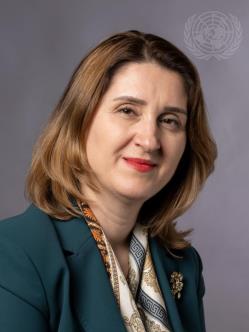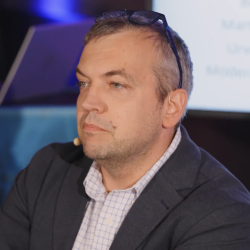Championing A New WSIS Action Line For PeaceTech
SocialTech Lab; Institute of Social Ethics, University of Lucerne
Session 281
Harnessing ICTs for Peacebuilding and Conflict Prevention
In a world grappling with rising conflict and division, can entrepreneurship and innovation become tools for peace? How can international organizations like ITU support this process through sustainable policy development and governance strategies? What is the role of standard development, public-private partnerships and inclusive multistakeholder processes to foster innovative ICT applications for peacebuilding, crisis response, and reconciliation? This interactive panel explores how technology, youth empowerment, and transnational collaboration can transform fragile societies from the bottom up, and how international organizations like ITU and WSIS can support such processes.
From digital peacebuilding tools to cross-cultural startup accelerators, hear how grassroots peace innovation initiatives are fostering economic collaboration and social cohesion in places like Europe’s divided capital of Nicosia, the Western Balkans, the Middle East, and beyond. And discuss with us how new partnerships connecting the local with the global can be formed for facilitating peaceful conflict transformation.
We’ll unpack:
- What it takes to at the same time build inclusive, locally-rooted, and globally-scalable PeaceTech ecosystems
- How youth-led innovation is creating new pathways to economic and social resilience
- What cross-border entrepreneurship looks like in divided societies
- How digital tools and startup accelerators can bridge historical divides
- What it really means to build “inclusive digital societies” in fragile contexts
- How international organizations like ITU and WSIS can support such initiatives
An interactive discussion with the audience will explore the proposal of a new WSIS action line dedicated to PeaceTech with the goal of creating more global partnerships and progress in the field.
This session is for changemakers, policymakers, and technologists eager to reimagine peace through the lens of innovation.





-
 C1. The role of governments and all stakeholders in the promotion of ICTs for development
C1. The role of governments and all stakeholders in the promotion of ICTs for development
-
 C3. Access to information and knowledge
C3. Access to information and knowledge
-
 C4. Capacity building
C4. Capacity building
-
 C5. Building confidence and security in use of ICTs
C5. Building confidence and security in use of ICTs
-
 C6. Enabling environment
C6. Enabling environment
-
 C10. Ethical dimensions of the Information Society
C10. Ethical dimensions of the Information Society
-
 C11. International and regional cooperation
C11. International and regional cooperation
This session is aligned with several WSIS Action Lines, particularly C1 (the role of all stakeholders in promoting ICTs for development), C3 (access to information and knowledge), C4 (capacity building), C5 (Building confidence and security in use of ICTs) C6 (enabling environment), C10 (Ethical dimensions of the Information Society), and C11 (international and regional cooperation). By showcasing PeaceTech as a transformative tool for peacebuilding, cross-border entrepreneurship, and social cohesion in fragile contexts, the session promotes inclusive digital innovation ecosystems that empower youth, build local capacity, and foster multistakeholder collaboration. It also proposes the establishment of a new WSIS Action Line for PeaceTech, aiming to consolidate and scale efforts in leveraging ICTs for sustainable peace.
-
 Goal 1: End poverty in all its forms everywhere
Goal 1: End poverty in all its forms everywhere
-
 Goal 8: Promote inclusive and sustainable economic growth, employment and decent work for all
Goal 8: Promote inclusive and sustainable economic growth, employment and decent work for all
-
 Goal 9: Build resilient infrastructure, promote sustainable industrialization and foster innovation
Goal 9: Build resilient infrastructure, promote sustainable industrialization and foster innovation
-
 Goal 10: Reduce inequality within and among countries
Goal 10: Reduce inequality within and among countries
-
 Goal 16: Promote just, peaceful and inclusive societies
Goal 16: Promote just, peaceful and inclusive societies
-
 Goal 17: Revitalize the global partnership for sustainable development
Goal 17: Revitalize the global partnership for sustainable development
The session advances key Sustainable Development Goals, particularly SDG 16 (promote just, peaceful and inclusive societies) and SDG 17 (strengthen global partnerships), by exploring how digital innovation can be harnessed for peacebuilding in conflict-affected regions. It also supports SDGs 4, 5, 8, 9, and 10 through its emphasis on inclusive education, gender equality, youth-led entrepreneurship, resilient digital infrastructure, and reducing inequality through cross-border collaboration. By showcasing real-world PeaceTech initiatives and proposing new global frameworks, the session contributes to building more cohesive, resilient, and equitable societies through ICT-enabled solutions.
- Objective 1: Close all digital divides and accelerate progress across the Sustainable Development Goals
- Objective 2: Expand inclusion in and benefits from the digital economy for all
- Objective 3: Foster an inclusive, open, safe and secure digital space that respects, protects and promotes human rights
- https://socialtechlab.org/
- https://base.cyprusinno.com/
- https://www.unilu.ch/en/faculties/faculty-of-theology/institutes-and-research-units/institute-of-social-ethics-ise/overview/
- https://www.linkedin.com/company/socialtech-lab
- https://www.linkedin.com/company/cyprusinno
- https://www.linkedin.com/showcase/thebasecy